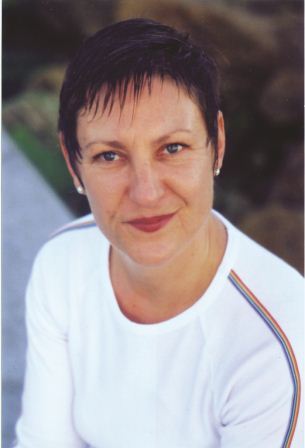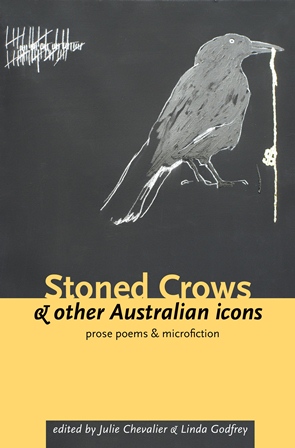 1. What inspired you to write the prose poem/microfiction which is published in Stoned Crows & other Australian icons?There were a number of inspirations for these prose poems.
1. What inspired you to write the prose poem/microfiction which is published in Stoned Crows & other Australian icons?There were a number of inspirations for these prose poems.
‘At Sculpture by the Sea’ is probably self-explanatory. It was a damaging experience in many ways.
‘The Mind Travels’ was my awareness that the mind goes as the speed of light, but the pen travels slower and that the disjunction is constant. I decided to record just one complete disjunction. It seemed to me that trout were a rather lovely image for the wriggling and beauteous operation of the mind which I experience as three-dimensional, not linear.
‘Diurnal: Slurry Heights’ was my first attempt to record my daily experience of living in Surry Hills in Sydney. I lived there for 11 years, the longest period I lived anywhere in my life. I couldn’t understand, before writing this poem under self-imposed compulsion, why I had not written about my ‘diurnal’ experience before. I’m still not clear because it’s a wonderfully diverse community.
2. Tell us about your process. (Do you start sparse and widen out, or do you write down every possible association and cut back? Do you research the subject matter you are writing about? Is it pure intuition?) Take us through an example if you want.
For these prose poems, I worked at them in stages. Initially, I poured detail into my journal, longhand, and then selected phrases which I thought most telling. A fluent response to the subject, followed by a refining process, helps me when I am crafting a prose poem. It is a different process from other forms of free verse poems. Generally, I allow myself a lighter touch with prose poems—I may use speech rhythms and syntax; or experiment by removing all indefinite articles; or mash images and let the flow-on of the lines influence the meaning.
If I am disciplined, I might catch a rainbow trout on the page and if I’m a good journeyman, I’ll skin and fillet it adequately. Sometimes, the product is thought worth preserving (pickled, dried, smoked?) [Was that a dad-joke metaphor?]
3. What advice do you have for other writers ? about the first or last line? About how to choose the title? Do you follow any rules?
Hard question. It’s a very sensitive and important thing, the first and last line question, not that you think about it overtly while you are writing. However, they — and the title — are very important to the editing process, I find. There are no rules, so far as I’m aware, but there are many things to be tried out. Sometimes ‘title’ is about theme or grand statement, other times it’s about obliquity or intimation; the last line/lines are about suggestion, other times about resolution, others about perception. It’s not possible to be legalistic about them. It’s a matter of tone, purpose, subtlety.
4. Who or what inspires your writing?
I could go on for about a month. Charles Wright, Federica Garcia Lorca and The King James Bible all send me into fits of creativity. Solitude and simplicity. Poetry which I read in journals, saturating myself in entire books – reading from cover to cover and re-reading; reading articles in journals, essays, attending poetry events at writers festivals. Poetics papers given on panels … for some reason they are catalytic. I find the original synaptic connections which spark my poems are fleeting, that they are easily silenced or noised-out by everyday city life. To capture them I carry a notebook. After a weekend in the country where I have started to attend to the ideas and to heed the excitement of them coming up to the surface, I drive home and have to pull into the side of the road about 5 or more times, slam on the handbrake and pull out the notebook and start scribbling. As far as I’m concerned, this is a state of ecstasy. Cheap, huh?
5. Tell us what you do if you haven’t written anything in a while and you want to get started writing again? Could you share your favourite writing exercise with our readers?
Oh yes, I know this so well! To quieten the self-critic, I use the classic journal writing exercise. It’s more fun done with a writer-friend in a café (and dispels neurosis) but works solo too. I focus on each sense in turn and record without stopping what the sense is reporting to me about the world. I might allow myself a time in which to complete the work. I don’t change what I’ve written, I don’t edit it, I don’t worry about gaps in the information-feed coming through, my aim is just to keep being a channel for the sense’s report and always to keep writing, until the time is up. Then I turn the page and go on to the next exercise. I try not to judge myself or the product, just take pleasure in the process. If I’m with someone who enjoys doing these exercises, we may read our work aloud to each another (it’s very interesting hearing the product of the other person’s senses given the same environment and we will often be able to surprise ourselves with the quality of what we are reading/listening to). I do a couple of these before then giving myself a long, long time to continue to write—I might open a book, close my eyes and stab the pen or pencil on the page. Wherever it lands, I transcribe a phrase into my journal and then start with this phrase and write for a given period of time, say 20 mins, or for 3 full pages of the journal. Just the same as the sensory exercise, no stopping, no scratching out, no editing.
It is, of course, an artificial technique. However, be amazed by where your brain has led you by the time you are on that third page.
